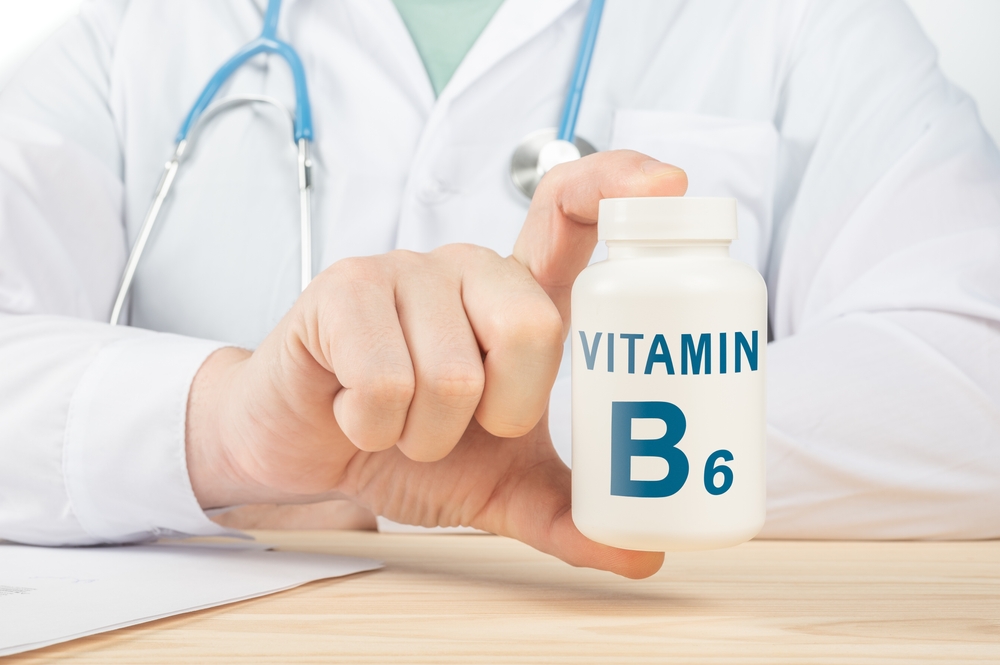There’s no denying the importance of vitamins for your health and general well-being. There’s vitamin C that you need for a hydrated and rejuvenated skin. Then, there’s vitamin D that gives a boost to your bones.
Vitamin B-complex is a family of vitamins that are holy-grail for your skin and health.
B vitamins help our systems transform the food we eat into the energy we require to function.
The B vitamin complex, which consists of eight different vitamins, is essential for metabolism, brain and liver function, growth, and the formation of blood cells, as well as keeping healthy hair, skin, and vision.
In this article, we are going to talk about one of the most important B vitamins, which is B6. Keep on reading to find out amazing vitamin B6 uses for your health and skin.
Table of Contents
Vitamin B6 Benefits – What Does it Do for Your Health?
Vitamin B6, often known as pyridoxine, is one of the eight B vitamins required for good health.
This nutrient is required for almost 200 chemical reactions in your body, as well as functions such as brain growth and oxygen transport through your bloodstream.
Here’s a list of vitamin B6 benefits that implies why you should start taking more foods with vitamin B6:
1. Helps Turn Food into Energy
B6, like the other B vitamins, helps the body convert food into energy. It aids in the digestion of carbohydrates and collaborates with enzymes to break down proteins into amino acids, which are essential for our bodies to grow and operate properly.
2. Supports Heart Health
Vitamin B6 reduces homocysteine levels by collaborating with two other B vitamins, B12 and folic acid.
Homocysteine levels above a certain threshold raise the risk of cardiovascular illness, heart attacks, strokes, and atherosclerosis, a disease in which plaque builds up in the arteries.
Studies show that hyperhomocysteinemia can result from a vitamin B6 deficiency.
Homocysteine levels can be reduced by up to a third with the proper mix of B6, B12, and folic acid (B9).
It’s worth noting that, despite decreasing homocysteine levels, patients don’t perceive a difference in their vascular results. As a result, B-vitamins may play a greater role in heart health prevention.
3. Promotes a Healthy Brain Function
A rise in homocysteine levels can hasten cognitive deterioration. This rise may increase the risk of neurological diseases like dementia.
B6 is involved in the creation of key neurotransmitters, chemical messengers used by the brain and nervous system, in addition to regulating homocysteine levels.
B6 aids in the production of the following neurotransmitters:
Dopamine
Dopamine is a neurotransmitter that is involved in reward seeking, motivation, and movement.
Serotonin
Serotonin is a neurotransmitter that regulates mood and promotes emotions of well-being and happiness.
Melatonin
Melatonin is a hormone that helps us sleep by regulating our circadian cycle.
Noradrenaline
When we perceive danger, noradrenaline triggers the ‘fight or flight’ reaction in our bodies.
4. Helps with Morning Sickness
Anyone suffering from morning sickness during pregnancy is frequently administered a tablet containing doxylamine, an antihistamine, and vitamin B6. That’s one of the best vitamin B6 uses.
Studies show that vitamin B6 helps with nausea, and doxylamine helps with vomiting.
A normal three-times-daily dose of the combo tablet is 10 mg to 25 mg.
5. May Treat Seizures in Newborns
According to the top reviewed Neurosurgeon in Lahore, Dr. Muhammad Yasir Mukhtar “Children with pyridoxine-dependent epilepsy (PDE) require 15 to 500 mg of vitamin B6 every day for the rest of their lives.”
PDE is a rare hereditary disorder marked by difficult-to-control seizures that develops within a few days of birth. However, vitamin B6 can aid in the management of the illness.
Traditional anticonvulsants are not effective for those who have severe seizures, therefore they need vitamin B6 uses to keep the problem at bay.
6. Supports a Healthy Immune System
Vitamin B6 is required by the body in order to maintain a healthy immune system.
B6 enhances communication between chemokine-producing cells, which guide white blood cells to sites of infection or injury.
A lack of vitamin B6 inhibits the growth and generation of important immunological players such as lymphocytes and antibodies.
Lymphocytes are divided into two types, both of which are affected by a B6 deficiency:
T-cells
T-cells are immune cells that defend the body against foreign intruders.
B-cells
B-cells produce antibodies, which adhere to and eliminate foreign invaders such as bacteria and viruses.
7. Helps Prevent Anemia
Vitamin B6 uses are essential in the formation of hemoglobin, a protein that feeds the cells with oxygen.
One of the causes of anemia, a disorder defined by low amounts of red blood cells, is lower than normal hemoglobin levels. Red blood cells transport oxygen throughout the body, therefore a lack of red blood cells might make you feel weak and tired.
Getting enough vitamin B6 can help you avoid getting anemia.
8. Vitamin B6 Benefits for Your Skin and Hair
This vitamin helps stop acne from the start caused by hormonal fluctuations and helps make your skin resistant to the effects of testosterone.
Vitamin B6 supports moisturized, supple skin, and full lips. Insufficient amounts of B6 can result in dry, cracking skin, and chapped lips.
It helps your skin and body heal quickly and smoothly (less scarring) by aiding in the synthesis of RNA and DNA, the building blocks and blueprints of the body.
Vitamin B6 helps to support healthy, shiny hair by boosting its growth when used as a daily supplement.
9. May Promote Eye Health
Vitamin B6 may help to prevent eye problems, particularly age-related macular degeneration, a kind of vision loss that affects the elderly (AMD).
Studies show that high levels of circulating homocysteine in the blood have been associated with an increased risk of AMD.
Because vitamin B6 helps to lower homocysteine levels in the blood, getting enough of it may minimize your risk of developing this condition.
Vitamin B6 Food Sources
For the brain and body to function properly, the mood-controlling vitamin is absolutely essential.
Like all other water-soluble vitamins, vitamin B6 is also excreted by the body; therefore, to avoid deficiency symptoms, a diet high in vitamin B6-rich foods is advised.
Much to our relief, mother nature has given us an abundance of naturally occurring food sources that are rich in vitamin B6 and meet our daily needs.

Vegetable Sources
Vegetable sources include potato, sweet potato, bitter gourd, bitter melon, carrot, spinach, green peas, plantain, and avocado.
Fruit Sources
Fruit Sources include banana, papaya, orange, cantaloupe, durian and plum.
Legumes
Legumes include chickpeas, soybeans, beans, tempeh and lentils.
Nuts & Seeds
Nuts and seeds include pistachio, sunflower seeds and Chinese chestnuts.
Grains & Cereals
Grain products and cereals include waffles, wheat bran, fortified cereals and oatmeal.
Dairy Products
Dairy products include milk and ricotta cheese.
Animal Sources
Animal sources include eggs and chicken and other forms of meat, and fishes like salmon, tuna, herring, mackerel.
How Much Amount of Vitamin B6 Required, Everyday?
Your daily vitamin B6 requirements vary depending on your age, sex, and stage of life.
For healthy individuals (over the age of 18), including those who are pregnant or nursing, the daily recommended intake (DRV) for vitamin B6 is between 1.6 and 1.8 mg.
Putting it all Together!
The nervous system and metabolism are only two of the numerous bodily functions that vitamin B6 is crucial for. People must obtain this vitamin daily from their foods because the body cannot store it.
Majority of the people consume enough vitamin B6 through their foods. If not, you can consult a well-known dietician/nutritionist who could give you advice on dietary adjustments or supplementing with vitamin B6.
